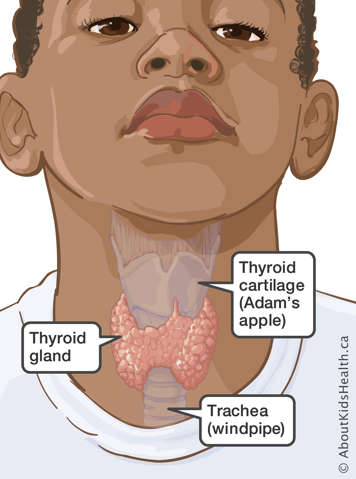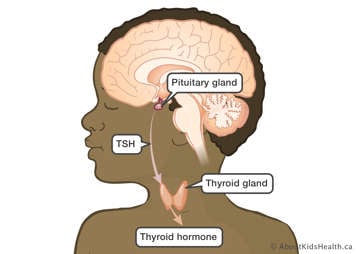What is the thyroid?
The thyroid is a gland located in the middle of the lower front of the neck. It produces hormones (called thyroid hormones) that are important for:
- growth
- body temperature control
- digestion
- body weight
- mood.

Like the pancreas in diabetes, the thyroid can be attacked by the immune system. The immune system makes proteins called antibodies that attack the thyroid. This attack can cause the thyroid to either slow down (hypothyroidism) or in rare cases, to become overactive (hyperthyroidism). About 20 to 25% of people with type 1 diabetes will develop thyroid problems, regardless of how well they control their diabetes or for how long they have had diabetes.

Hashimoto’s thyroiditis (hypothyroidism)
In Hashimoto’s thyroiditis, the immune system damages the thyroid gland, leading it to become underactive. Underactive thyroid is called hypothyroidism. Symptoms of hypothyroidism include:
- slower growth
- weight gain
- tiredness or sluggishness
- dry skin and hair
- problems concentrating
- constipation
- irregular menstrual periods
- weakness.
Under activity of the thyroid is detected by regular checks of thyroid function. The check involves measuring levels of the thyroid stimulating hormone (TSH) and measuring antibodies against the thyroid. TSH is a hormone (chemical messenger) made by a gland in the brain called the pituitary gland.
Grave’s disease (hyperthyroidism)
Grave’s disease happens rarely in people with diabetes. It is an immune system disorder that makes the thyroid overactive, meaning the thyroid makes too much thyroid hormone. Overactive thyroid is called hyperthyroidism. Symptoms include:
- weight loss
- increased appetite
- mood swings
- shakiness and sweating
- diarrhea
- bulging eyes.
Over active thyroid is often treated with a medication called methimazole that decreases the thyroid hormone levels.
